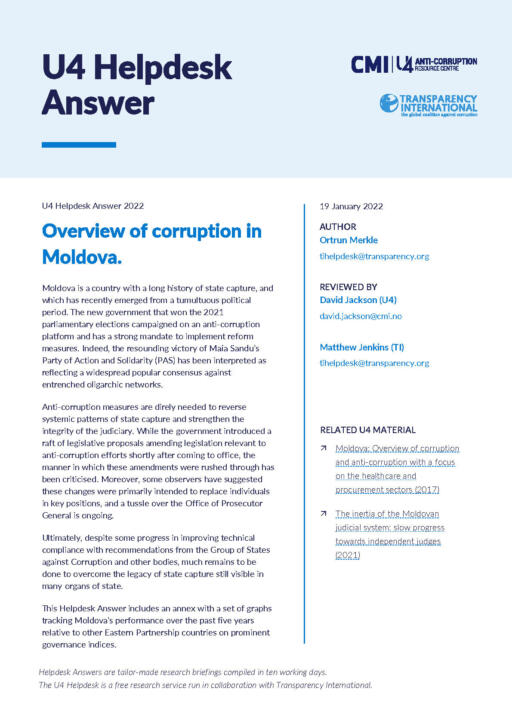
This Anti-Corruption Helpdesk brief was produced in response to a query from a U4 Partner Agency. The U4 Helpdesk is operated by Transparency International in collaboration with the U4 Anti-Corruption Resource Centre based at the Chr. Michelsen Institute.
Query
Please provide an overview of recent developments with regards to corruption and anti-corruption in Moldova, with a focus on state capture and the prospects for reform.
Summary
Moldova is a country with a long history of state capture, and which has recently emerged from a tumultuous political period. The new government that won the 2021 parliamentary elections campaigned on an anti-corruption platform and has a strong mandate to implement reform measures. Indeed, the resounding victory of Maia Sandu’s Party of Action and Solidarity (PAS) has been interpreted as reflecting a widespread popular consensus against entrenched oligarchic networks.
Anti-corruption measures are direly needed to reverse systemic patterns of state capture and strengthen the integrity of the judiciary. While the government introduced a raft of legislative proposals amending legislation relevant to anti-corruption efforts shortly after coming to office, the manner in which these amendments were rushed through has been criticised. Moreover, some observers have suggested these changes were primarily intended to replace individuals in key positions, and a tussle over the Office of Prosecutor General is ongoing.
Ultimately, despite some progress in improving technical compliance with recommendations from the Group of States against Corruption and other bodies, much remains to be done to overcome the legacy of state capture still visible in many organs of state.
Contents
- Overview of corruption in Moldova
- Extent of corruption
- Prospects for reform
- PAS dominance in the legislature
- Relative inexperience of PAS parliamentarians
- Systemic corruption challenges
- State capture
- Judiciary
- Stocktake of progress in tackling corruption over the last decade
- Annex 1: Moldova’s performance in international governance indices relative to other Eastern Partnership countries
- References
Main points
- The victory of the PAS party has been interpreted as a positive development that brings new momentum to anti-corruption efforts in the country.
- Nonetheless, systemic forms of state capture linger on and addressing entrenched corrupt networks will not be straightforward.
- The independence and integrity of key oversight institutions and the judiciary has long been compromised by political interference, and observers are watching carefully to see how the new government responds to setbacks in its reform agenda.
- The manner in which proposed amendments to relevant anti-corruption legislation were made has been criticised as not allowing sufficient time for consultation, and in certain cases seemingly targeted at removing specific individuals from their posts.
Authors
Ortrun Merkle, [email protected]
Reviewers
David Jackson (U4), [email protected]
Matthew Jenkins (TI), [email protected]
Date
28/03/2022

